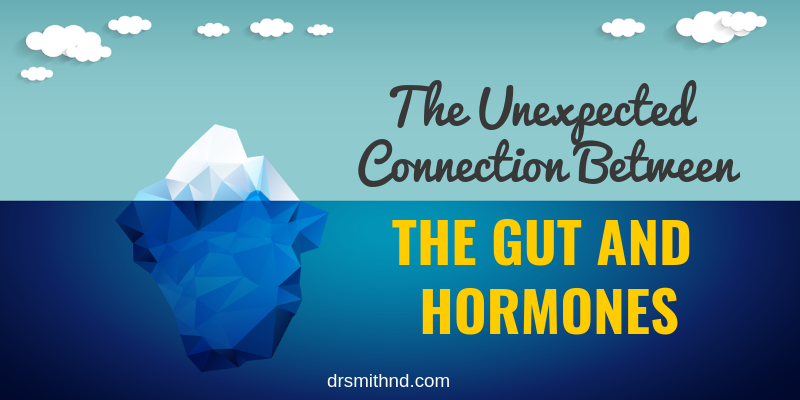Most of us don’t need an expert to tell us that the food we eat has an impact on our health at least in the most basic way: you eat crap you get a food hangover and gut rot, but the fact is, the impact is actually much, much bigger than that. What you put on your fork will have the single most significant impact on your health. Period.
In recent years we have gained more insight into the ways that food affects health because scientists have been delving into the vast world deep in our intestines…: the gut microbiome. So far we’ve really just seen the tip of the proverbial iceberg, but what we do know so far is that it plays a HUGE role in our mood, immune function and yes, ….even hormones.
So… what is the gut microbiome?
If you grew up in Canada when you hear the word “biome” you’re probably transported back to grade 4 science class. That’s when we typically started learning about habitats such as a rain forest or a desert, where particular plants and animals are found and live in symbiotic relationships.
The gastrointestinal microbiome is not so different than the biome of any other habitat in that it is home to millons of different species but in this case of bacteria, viruses, fungi and other microbes — that feed off of the food we eat and thrive in certain conditions, and get unbalanced in certain conditions.
Advances in genomic sequencing have allowed researchers to start identifying more microbes and studying them in greater detail allowing them to start determining what they do and what they require to thrive. Most importantly, it is allowing them to ascertain what a healthy gut microbiome actually is — with the right species of bacteria and in the right amounts — and how it is absolutely central to our health.
So how can a dysfunctional gut microbiome affect my health and hormones?
Studies published in the world’s top scientific journals show that when people have an unhealthy diet, are extremely stressed or take too many antibiotics, their gut microbiome becomes disrupted and unbalanced. This imbalance is called dysbiosis, and can have pretty radical effects on your health and wellbeing. It is something I am dealing with all day every day in practice because it impacts just about everything.
While scientists are only starting to understand the mechanisms around how the gut microbiome impacts hormones, at this point there is mounting evidence that it can contribute to causing various conditions. In clinical practice I see this evidence play out daily.
A good example of this is that women who have plant-based (this doesn’t mean vegetarian incidentally), nutrient rich, whole foods diets who are well hydrated, don’t drink much alcohol or caffeine, manage stress well and exercise regularly, have FAR less hormonal symptoms through perimenopause and menopause. FAR less. Without exception. I also have patients who manage 80-100% of their PCOS just with their lifestyle. Think about that for a minute.***
To date, the following conditions have been linked to dysbiosis with the list continuing to grow as scientists learn more about the relationship between our gut and hormones:
- Obesity
- Irritable Bowel Syndrome (IBS)
- Leaky gut syndrome
- Depression
- Endometriosis and Polycystic ovary syndrome (PCOS)
- Breast and ovarian cancers
Enter: the Estrobolome…
Within your gut’s microbiome there are a sub-set of proteins that are able to interact with estrogens in the body otherwise known as, the “estrobolome”. The estrobolome is capable of detoxifying estrogens which is important to hormone balance. An enzyme called beta glucuronidase disturbs this process resulting in impaired ability to detoxify estrogen, resulting in higher circulating levels.
The implication here is that higher estrogen levels lay the foundation for the potential development of various estrogen dominant conditions such as polycystic ovarian syndrome (PCOS), endometriosis, painful periods (dysmenorrhea), or estrogen related cancers.
The goal is, as ever, to find balance. The great news is that there are things we can do that decrease the levels of beta glucuronidase in our gut which can help to mitigate the levels of estrogen in your body.
What INCREASES beta glucuronidase and thus estrogen?
- alcohol
- antibiotics
- oral contraceptive pills
- higher amounts of adipose tissue (ie fat cells)
- high cholesterol (measured in the blood)
- eating processed food and thus not enough fiber*
What DECREASES beta glucuronidase and thus estrogen restoring hormone balance?
- Eat a diverse range of fiber containing plant foods including legumes, beans and fruit
- Eat fermented foods like yogurt, sauerkraut, kimchi, kefir
- Limit your intake of sugar, refined flour (bread, pasta), and artificial sweeteners that stimulate growth of unhealthy bacteria
- Eat whole grains but not too much (decrease these and up the veg)
- Try a plant-based diet which does not mean becoming a vegetarian it simply means GREATLY increasing your veggie intake (so happy the new Canada Food Guide has ½ the plate covered in veggies!!)
- Take antibiotics only when necessary as antibiotics kill bad and good bacteria alike
- Use probiotics to add certain microbes to your gut, in particular lactobacillus probiotic strains (reuteri, gasseri, and acidophilus)
- Exercise
- Decrease alcohol intake
Concerned that dysbiosis may be impacting your estrogen levels? Are you dealing with any of these conditions?
- Perimenopause
- Menopause
- PMS
- Stress and depression
- Insomnia
- Urinary incontinence
- Sexual health and libido
- Fibrocystic breasts
- Breast cancer prevention/ remission optimization
- Weight gain challenges
Consider coming to see me and learn about what I do to get my patients back into balance. As you now know, I use nutrition and lifestyle as the foundation for treating hormonal conditions but the fact is, in reality it is hard. Getting people to change their habits around food, exercise, alcohol intake, etc. is deep level work, is about the long game and is the most important thing I probably do in my work, but it takes time.
In the short term to get things rolling and people feeling better, I often will use a combined approach that may include botanical medicine (herbs), supplements and bioidentical hormone replacement therapy to get hormonal balance restored in my patients. The end goal for me – always-, is to coach my patients to get their lifestyle dialed up to the point that they require less supplements and medicines.
Consulting with Dr. Smith
If you are suffering and dealing with estrogen-related conditions or are concerned you may be, call the clinic at (416) 929-0707 to book either a 15 minute (complimentary) meet and greet appointment or become a patient and book your initial appointment (one hour) with Dr. Smith.
Dr. Smith has expertise in dysbiosis and other hormone-related conditions and is open to discuss your health goals and any questions you may have regarding your situation.



